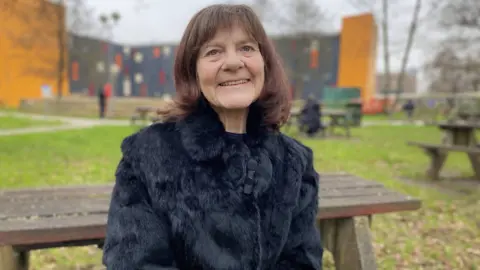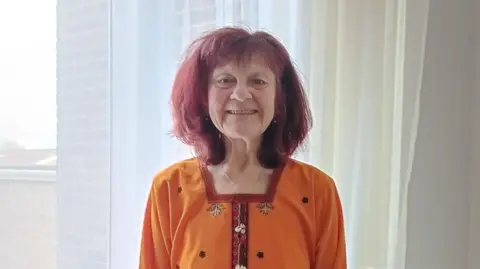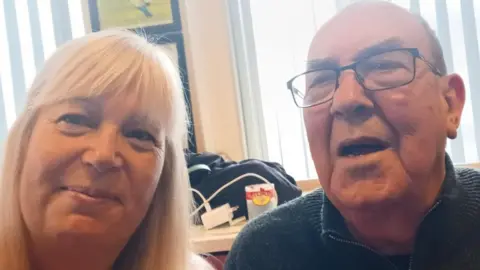'Why I choose to spend time with dying strangers'
 Marie Curie
Marie CurieSpending time with someone who is dying is something most of us will only have to experience maybe a handful of times in a lifetime.
For Hazel Orchard, it is a weekly occurrence.
Hazel is a hospital companion and volunteers her time offering a friendly ear to end-of-life patients.
The role involves listening, discussing challenging topics such as care plans and simply being present when family members need to rest or step away.
She said although it brought her grief and sadness it had also enriched her life.
"It is very emotional, I won't dilute that in any way, shape or form," said Hazel from Cardiff.
"But to support people on their journey as their body ebbs ever flowing to its final resting place is nothing other than a privilege."
 Marie Curie
Marie CurieHazel, 65, began volunteering for Marie Curie in September and since then has supported 10 patients, three of whom have now died.
"I do go and sit and light a candle for them and their families," she said.
"It is important to for me to express my own grief in a way... to be able to refuel and recharge and to be able to continue to give what is needed to the patients I support."
Although Hazel is passionate about the work now, when she first heard about the opportunity on social media she was far from keen.
"My first thought was 'I can't think of anything more horrific' and I bypassed it," said Hazel, who is retired after a career in children's services.
"However, interestingly it never really left my mind during the ensuing week and I found myself at times thinking about it."
"I then went back to it and thought 'why not?'."
After receiving training and getting her Disclosure and Barring Service (DBS) check she began volunteering at Cardiff's University Hospital of Wales.
"The very first patient that I was allocated was given 48 hours but I had the privilege of being able to visit with him and support him for two weeks," she said.
She said his death had an impact on her.
"We'd started to get to know each other quite well and to have difficult conversations about dying and death," she said.
Another patient she was supporting found it difficult to talk about her situation.
Hazel discovered she enjoyed word searches so made some for her using words that could serve as potential conversation-starters.
Since January she has been supporting a man who has lung and blood cancer.
He has been discharged so she now visits him weekly at home.
"We have deep conversations about life," she said.
"He talks comfortably with me about his diagnosis and cancer and I would say that our relationship is ever-evolving and I'm privileged that I'm still able to journey with him."
Some patients don't want to upset their families by talking about their fears around death, said Hazel.
"So they find me an easier person to talk to and confide in because I'm neutral."
So what do people want to talk about when they know they have weeks or days to live?
"Family, it is definitely family, family, family," said Hazel.
"You see the face light up from being able to recall experiences in life.
"Some people will go right back to their childhood."
She said others were scared of the unknown.
"My heart and my soul grieves to see fear and to hear fear and anxiety in people that they don't know where they're going," she said.
Some people want to talk about their regrets.
"It's things they've not done that they wanted to do - it could be holidays, alterations they wanted to make to their home or garden, things to do with their hobbies or around family matters."
She said on more than one occasion she had heard regrets at not repairing a broken relationship.
"There's a sadness that restoration hasn't taken place," she said.
Hazel said she had already begun trying to live a simpler life before her volunteering but these experiences had further encouraged her in this pursuit.
"We're made to believe that we are successful and our status is improved by what career we have, how much money we've got in our bank, what big posh house we've got, how many holidays abroad we go on and how many flashy cars we own - absolutely no, no, no," she said.
"Material things are as not as important to me as life itself."
 Family photo
Family photoEve Morse, 63, from Upper Killay, Swansea also volunteers with Marie Curie.
She has been a companion for two years, supporting Dave, who has dementia and his wife, Peggy.
She decided to get involved after her father-in-law was cared for at home for six months by Marie Curie nurses.
Dave, 82, was told by doctors he was expected to live for about a year - that was two-and-half years ago.
When Eve first began visiting Dave and Peggy at their home in Goytre, Port Talbot, she would often take him to his local rugby club so he could sit with his friends.
"I got to know them all, we'd be chatting, they'd put music on the jukebox and he'd be singing along," she said.
"You could see he was declining but he was enjoying life and he wasn't left out of anything.
"He was a big character and everyone knew him from working in the steelworks, being in the choir, the football, the rugby and so everyone who came in the first week or so were giving him a hug and a kiss, it was fabulous."
This also gave Peggy, 79, some much-needed respite.
"She said if it hadn't been for me she wouldn't have been able to have a shower or do anything," said Eve.
"He'd be bouncing around the house, trying to escape and he did several times."
 Family photo
Family photoDave now lives in a care home so every week Eve collects Peggy so they can visit him together, and then she and Peggy head out for lunch afterwards.
"It just makes you feel warm inside that you can give something back to lovely people," said Eve.
"They didn't ask to be in this position... I'm really glad to be able to give them a little bit of a break and give some love and companionship, it's an honour to do it."
Eve is prepared to be with Dave and Peggy when he eventually passes away.
"I've got no fears about that because when you grow to like a family, they become part of your heart," she said.
Peggy said she often got "a bit emotional" when talking about Eve.
"She is absolutely wonderful, she's one of my best friends and I get a bit annoyed with her sometimes because she takes on so much," she said.
She said Eve's support made the future easier to face.
"Dave's deteriorating but I feel that when his time comes it's going to be much easier with Eve there," she said.
"I know that Eve will always be there, even after David's days because she's now become a friend.
"I think God was really on my side when he gave me Eve."
